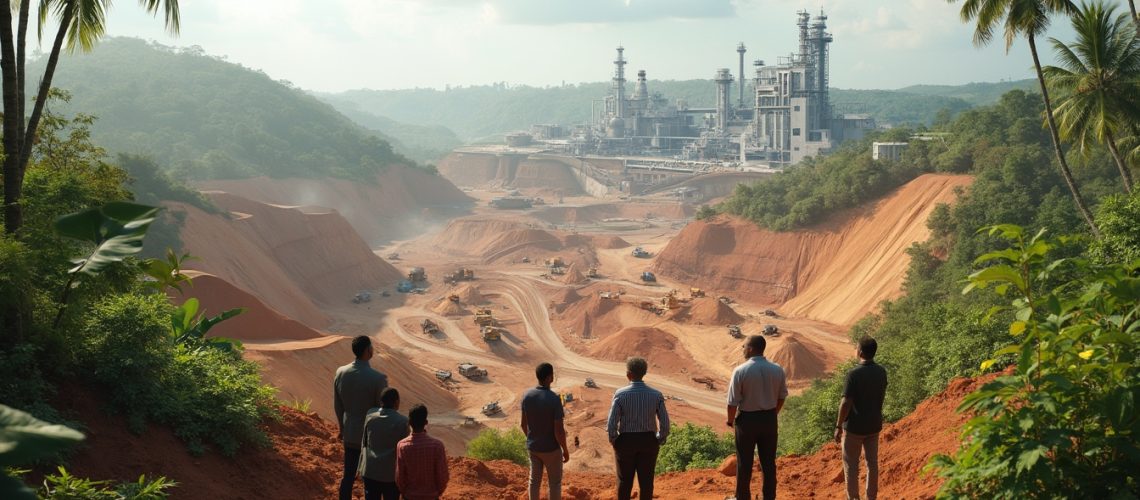Implications of Guinea’s Bauxite Disruption and Economic Playbook: Lessons from Indonesia
Global bauxite markets are experiencing significant turbulence as Guinea, a critical player in the global alumina supply chain, signals potential strategic shifts reminiscent of Indonesia’s resource sovereignty approach. The recent suspension of bauxite exports by Emirates Global Aluminium (EGA) from its Guinea Alumina Corporation (GAC) highlights the complex geopolitical dynamics reshaping mineral resource strategies.
Why Is Guinea’s Bauxite Supply Critically Important?
Guinea’s significance in the global mineral landscape cannot be overstated. As the second-largest global bauxite producer, the nation mined approximately 87.9 million tonnes in 2023, positioning itself just behind Australia in production volume. Bauxite serves as a fundamental precursor to alumina and ultimately aluminium, materials essential for industries ranging from construction to advanced technology.
The strategic importance of Guinea’s bauxite production becomes evident when examining key export figures. Emirates Global Aluminium’s Guinea Alumina Corporation exported 12.8 million tonnes in 2023, underlining the nation’s critical role in global mineral supply chains. These substantial export volumes demonstrate why any disruption can send ripples through international commodity markets.
Current Market Developments: Suspension and Uncertainty
Recent events have introduced significant uncertainty into the bauxite market. In October 2024, EGA confirmed that its bauxite exports from Guinea were suspended by customs, creating immediate market tension. Simon Wensley, CEO of Metro Mining, characterised Guinea’s governance under the military junta as “inherently unstable and high-risk”, highlighting the geopolitical complexities surrounding mineral resource management.
The market’s response was swift and telling. The Shanghai Metal Exchange saw alumina prices jump 6.4% to ¥4,630 ($971) per tonne, reflecting immediate concerns about potential supply constraints. This price movement underscores the delicate balance of global mineral supply chains and their vulnerability to regional political shifts.
Lessons from Indonesia: A Resource Sovereignty Blueprint
Indonesia’s strategic approach to mineral exports provides a compelling template that Guinea appears to be studying closely. In 2023, Indonesia prohibited bauxite exports to incentivise domestic mineral refinement, mirroring its successful nickel strategy from 2020. This policy dramatically transformed Indonesia’s economic landscape, driving nickel export revenue from $1.6 million in 2014 to $31.1 billion by 2021 – a remarkable 19-fold increase.
Guinea’s Emerging Industrialisation Strategy
The West African nation is demonstrating clear intentions to follow Indonesia’s resource sovereignty model. Recent policy changes prioritise domestic refinement, with key government mandates including strategic partnerships with industry leaders. A notable example is the collaboration with the Aluminium Corporation of China (Chalco) for a $4 billion alumina refinery project, set to deliver 1.2 million tonnes annually post-2026.
Investing Strategies in Resource-Heavy Jurisdictions
Investors must carefully navigate Guinea’s evolving landscape. Key risk factors include governance instability, uncertain regulatory frameworks, and significant compliance challenges. However, opportunities exist for those willing to speculate on long-term high-margin projects, particularly in investing in mining stocks.
Diversification emerges as a critical strategy. Investors are advised to balance portfolios by including producers in stable regions like Australia while maintaining speculative positions in Guinea’s emerging projects. Monitoring shifts in Chinese construction demand could provide additional insights, as further economic stimulus might amplify aluminium requirements and reshape market dynamics.
Geological and Technological Considerations
Guinea’s bauxite grades remain globally competitive, though the nation depends on imported refining materials like energy and caustic soda. CRU analysts project plans for six alumina refineries in Guinea, with a potential capacity of 11 million tonnes per year. The digital transformation in mining will play a crucial role in optimising these emerging refinement capabilities.
Comparatively, Chinese bauxite grades are deteriorating, increasing reliance on imports from Guinea and other regions. Australia continues to serve as a lower-risk supply hub, though environmental and cost limitations are increasingly challenging.
Future Market Scenarios
Potential scenarios include widespread export restrictions potentially inflating global aluminium costs, China deepening partnerships with Guinea through Chalco, and non-African producers like Brazil and India expanding operations to absorb displaced demand.
Conclusion: Navigating Resource Nationalism
Guinea’s evolving bauxite policies, influenced by Indonesia’s resource control strategies, represent a growing trend of resource nationalism reshaping the mining sector. While investment opportunities exist, they remain fraught with geopolitical, economic, and operational risks.
Stakeholders must adapt by carefully diversifying holdings and embracing sustainable long-term strategies. As the industry continues to transform, understanding these complex dynamics becomes paramount for successful resource investment.
For more detailed insights, refer to the original analysis here.
Ready to Unlock the Next Big Mineral Discovery?
Discover how Discovery Alert’s real-time, AI-driven notifications can transform your investment approach by providing insights into the ASX’s most promising opportunities. Whether you’re considering short-term trades or long-term commitments, our service offers the perfect blend of speed and precision. Join us today and take advantage of our 30-day free trial. Explore this game-changing service at Discovery Alert and elevate your investment strategy.







